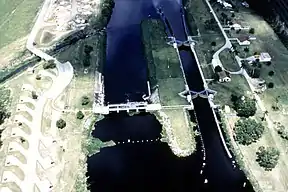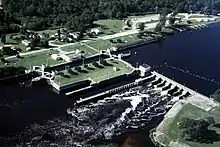| Okeechobee Waterway | |
|---|---|
 Ortona Lock and Dam on the Caloosahatchee River, part of the Okeechobee Waterway | |
| Location | South Florida |
| Country | United States |
| Coordinates | 26°48′22″N 81°06′46″W / 26.80611°N 81.11278°W |
| Specifications | |
| Length | 154[1] miles (248 km) |
| Locks | 5 |
| Status | Open |
| Navigation authority | U.S. Army Corps of Engineers |
| Geography | |
| Start point | San Carlos Bay |
| End point | Indian River Lagoon |

The Okeechobee Waterway or Okeechobee Canal is a relatively shallow artificial waterway in the United States, stretching across Florida from Fort Myers on the west coast to Stuart on Florida's east coast. The waterway can support tows such as barges or private vessels up to 50 feet (15 metres) wide x 250 feet (76 metres) long which draw less than 10 feet (3.0 metres),[2] as parts of the system, especially the locks may have low water depths of just ten feet.[2] The system of channels runs through Lake Okeechobee and consists of the Caloosahatchee River to the west of the lake and the St. Lucie Canal east of the lake.[1]
Geologically and geographically, the north bank of the canal is the official southern limit of the Eastern Continental Divide.
History
It was built/finished in 1937 to provide a water route across Florida, allowing boats to pass east–west across the state rather than traveling the long route around the southern end of the state.
Management
Lake Okeechobee and the Okeechobee Waterway Project is part of the complex water-management system known as the Central and Southern Florida Flood Control Project. The projects cover 16,000 square miles (41,000 km2) starting just south of Orlando and extending southward through the Kissimmee River Basin to the Everglades National Park to Florida Bay.[1]
The U.S. Army Corps of Engineers manages five locks and dams along the Okeechobee Waterway.
Locks and dams
St. Lucie Lock and Dam
The St. Lucie lock was built in 1941 for navigation and flood-control purposes. In 1944, the connecting spillway structure was built for flood and regulatory flow control through the St. Lucie Canal to manage the water level in Lake Okeechobee.[3]
Port Mayaca Lock and Dam
The Port Mayaca Lock and Dam was built in 1977 for navigation purposes, to permit the raising of water levels in Lake Okeechobee, and to moderate the effects of higher lake stages along the St. Lucie Canal.[4]
Ortona Lock and Dam
The Ortona Lock and Dam were constructed in 1937 for navigation purposes.[5]
In 1934, the locks were dredged by Captain James B. Cox, who worked on the Hoover Dike, with Robert Pierce as engineer. The first lockmaster was Jack O'Day, then Captain Cox, afterward.[6]
Moore Haven Lock and Dam
The Moore Haven Lock and Dam were constructed in 1935 for navigation and flood-control purposes.[7]
[8]Lock was renamed Julian Keen Jr. Lock and Dam. Effective: 06/18/2021 Notice to Navigation 2021-014
W.P. Franklin Lock and Dam
The W.P. Franklin Lock and Dam were constructed in 1965 for flood control, water control, prevention of saltwater intrusion, and navigation purposes.[9]
See also
References
- 1 2 3 "U.S. Army Corps of Engineers - Okeechobee Waterway".
- 1 2 3 U.S. Army Corps of Engineers, St. Lucie Locks webpage.
- ↑ "U.S. Army Corps of Engineers- St. Lucie Lock and Dam".
- ↑ "U.S. Army Corps of Engineers- Port Mayaca Lock and Dam".
- ↑ "U.S. Army Corps of Engineers- Ortona Lock and Dam".
- ↑ Wright & Ratzlaff (1985). Glades County: Florida History. P.O. Box 1069, Moore Haven, Florida 33471: Rainbow Books / Betty Wright.
{{cite book}}: CS1 maint: location (link) - ↑ "U.S. Army Corps of Engineers- Moore Haven Lock and Dam".
- ↑ "Okeechobee Waterway". Retrieved 2023-09-13.|CaptainJamesLowe.com
- ↑ "U.S. Army Corps of Engineers- W.P. Franklin Lock and Dam".
External links
- Cruising the Okeechobee Waterway - BlueSeas
- Okeechobee Waterway - U.S. Army Corps of Engineers Jacksonville District
- Lake Okeechobee Watershed - Florida DEP
- HAER No. FL-18, "Moore Haven Lock, Cross-State Canal, Okeechobee Intracoastal Waterway, Moore Haven, Glades County, FL"
- HAER No. FL-18-A, "Moore Haven Lock, Hurricane Gate No. 1"
- HAER No. FL-18-B, "Moore Haven Lock, Lock Control House"
- HAER No. FL-18-C, "Moore Haven Lock, Lock Tender's House/Office"
- HAER No. FL-18-D, "Moore Haven Lock, Lock Tender's House"
- HAER No. FL-18-E, "Moore Haven Lock, Warehouse"
- HAER No. FL-18-F, "Moore Haven Lock, Generator House"
- HAER No. FL-18-G, "Moore Haven Lock, Fire Pump House"
- HAER No. FL-18-H, "Moore Haven Lock, Garage"
- HAER No. FL-18-I, "Moore Haven Lock, Spillway"
- HAER No. FL-19, "Ortona Lock, Caloosahatchee River, Cross-State Canal, Okeechobee Intracoastal Waterway, Ortona, Glades County, FL"
- HAER No. FL-19-A, "Ortona Lock, Lock No. 2"
- HAER No. FL-19-B, "Ortona Lock, Lock No. 2, Machinery and Control Houses"
- HAER No. FL-19-C, "Ortona Lock, Lock No. 2, Lock Tender's House"
- HAER No. FL-19-D, "Ortona Lock, Lock No. 2, Power House"
- HAER No. FL-19-E, "Ortona Lock, Lock No. 2, Water Treatment Plant"
- HAER No. FL-19-F, "Ortona Lock, Lock No. 2, Fire Pump House"
- HAER No. FL-20, "St. Lucie Canal, St. Lucie, Cross State Canal, Okeechobee Intracoastal Waterway, Stuart vicinity, Martin County, FL"
- HAER No. FL-20-A, "St. Lucie Canal, St. Lucie Lock No. 1"
- HAER No. FL-20-A-1, "St. Lucie Canal, Lock No. 1, Control Station"
- HAER No. FL-20-A-2, "St. Lucie Canal, Lock No. 1, Machinery Houses"
- HAER No. FL-20-A-3, "St. Lucie Canal, Lock No. 1, Hydroelectric Power House"
- HAER No. FL-20-A-4, "St. Lucie Canal, Lock No. 1, Attendant's Quarters"
- HAER No. FL-20-A-5, "St. Lucie Canal, Lock No. 1, Attendant's Quarters"
- HAER No. FL-20-B, "St. Lucie Canal, Lock No. 2"
- HAER No. FL-20-B-1, "St. Lucie Canal, Lock No. 2, Dredge Bypass"
- HAER No. FL-20-B-2, "St. Lucie Canal, Lock No. 2, Control House"
- HAER No. FL-21, "Cross-State Canal, Lake Okeechobee vicinity, Glades County, FL"